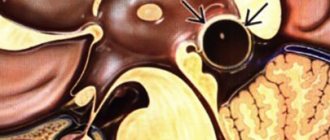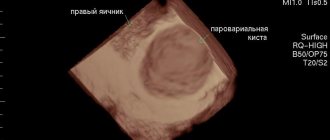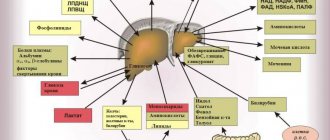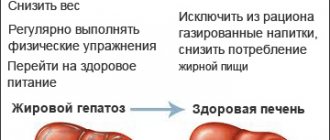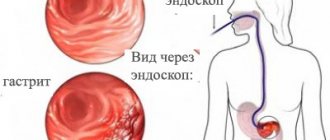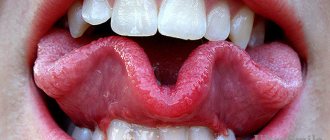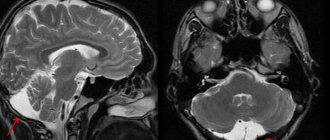Liver cyst (ICD code 10) is a very common focal benign neoplasm of the liver, which is a cavity filled with fluid, the composition of which depends on the type of neoplasm. The cyst itself does not pose any serious threat to human health and life, but if it ruptures, infection and suppuration may occur in the cavity.
What is a simple liver cyst?
A liver cyst (ICD code 10) is a cavity formation filled with a clear, colorless and odorless liquid. In some cases, the cyst contains an infiltrate - fluid mixed with blood and lymph, or a greenish-brown fluid consisting of mucin, bilirubin, fibrin, cholesterol and epithelial cells.
The pussy is usually localized in different segments and ligaments of the liver, both deep and on the surface of the organ. The size of this neoplasm varies from 1-2 mm to 20 cm or more. Women are more prone to developing liver cysts than men. The average age of onset of this pathology is 40-50 years. Very often, the formation of a cyst is associated with cirrhosis of the liver, cholelithiasis, polycystic ovaries, kidneys, pancreas, as well as bile duct cysts.
Parasitic formations
Cysts can appear as a result of the penetration of helminth larvae into the capillaries of the organ. At the same time, there are two types of parasites that provoke pathology. Echinococcal formations in the liver occur when drinking water from a natural reservoir, eating unwashed wild berries and during contact with animal fur. The parasite larvae penetrate the liver through the stomach and settle there. Gradually, a connective tissue capsule forms around them.
Alveococcal cysts are characterized by multilocularity and multiple liver lesions. And it occurs most often in those who deal with wild animals. The symptoms of both types of diseases are similar at the initial stage and differ when the cavity reaches a diameter of more than 6 cm, among them:
- heartburn and bloating;
- nausea, vomiting, bitter taste in the mouth;
- pain in the right hypochondrium.
Without treatment, the situation will worsen, leading to weight loss, aversion to food, and a feeling of constant fatigue. An alveococcal cyst is characterized by the growth of a node into the bile ducts, so the main symptom will be jaundice. At the initial stage, treatment can be therapeutic, but if there are no positive results, a modern surgical technique is used - laparoscopy of liver cysts, which is performed at the Biljak Clinic. This type of surgery has many advantages: a short recovery period, no damage to organ tissue, and no possibility of infection.
Liver cyst: causes
The reasons for the formation of cysts directly depend on their type. For example, a true cyst forms during intrauterine development, however, what causes this has not yet been determined. An acquired cyst can occur against the background of an infectious or inflammatory disease (especially due to inflammatory hyperplasia of the biliary tract), tumor necrosis or mechanical trauma to the liver. At the moment, there are studies confirming the theory of the influence of hormonal levels, and in particular increased estrogen hubbub, on the development of liver tumors.
In order to find out the causes of the disease, it is necessary to conduct a series of laboratory tests, since only by knowing the root of the disease can you completely get rid of it. Gastroenterologists, parasitologists and infectious disease specialists at the Yusupov Hospital prescribe a series of tests that allow a comprehensive examination of the cause of the development of the cyst. We guarantee fast and efficient completion of all diagnostic measures using the most modern equipment that meets all European standards.
Classification of liver cysts
There are two main groups of cysts:
- Parasitic liver cyst. The parasitic cyst is where the tapeworm larva lives. Such cysts are divided into echinococcal and alveococcal, depending on the causative agent of the disease. In the cavity of the cyst, this worm can develop and grow for up to 15 years. After reaching a certain length, the tapeworm Echinococcus granulosus moves to the small intestine, where it continues to exist at the expense of the resources of the human body. The cause of the occurrence and development of the parasite in the liver is infection with worms through dirty hands, raw meat, etc. Echinococcal liver cyst appears after contact with infected animals;
- non-parasitic (retention) liver cyst. Non-parasitic liver cysts can be false or true. True ones are formed during intrauterine development due to the incomplete development of the biliary tract system. False cysts are divided into two types due to their occurrence: traumatic and inflammatory. Inflammatory is formed against the background of an inflammatory process (abscess, necrosis, cirrhosis of the liver, etc.), traumatic appears due to rupture or mechanical damage to the liver.
The best gastroenterologists in the capital are treating liver cysts at the Yusupov Hospital. Thanks to the latest equipment and many years of experience of our specialists, treatment is carried out quickly and as efficiently as possible. In their practice, doctors at the Yusupov Hospital use the most modern methods and technologies that are suitable for each patient.
Our doctors
Prokhorov Yuri Anatolievich
Surgeon, head of the surgical service of CELT, candidate of medical sciences, doctor of the highest category
32 years of experience
Make an appointment
Lutsevich Oleg Emmanuilovich
Chief Surgeon of CELT, Honored Doctor of the Russian Federation, Chief Specialist of the Moscow Department of Health in Endosurgery and Endoscopy, Corresponding Member of the Russian Academy of Sciences, Head of the Department of Faculty Surgery No. 1 of the State Budgetary Educational Institution BPO MGMSU, Doctor of Medical Sciences, Doctor of the Highest Category, Professor
42 years of experience
Make an appointment
Gordeev Sergey Alexandrovich
Surgeon, Candidate of Medical Sciences, doctor of the highest category
41 years of experience
Make an appointment
Grossman Stanislav Sergeevich
Surgeon, Candidate of Medical Sciences
Experience 26 years
Make an appointment
Liver cyst - symptoms and complications
Small liver cysts have no symptoms and are rarely diagnosed in the early stages. Clinical manifestations occur after the cyst reaches more than 7 cm in diameter, or when multiple cysts affect more than 20-30% of the volume of the liver parenchyma. The main manifestations of liver cysts include:
- dizziness;
- feeling of heaviness in the right hypochondrium;
- dyspepsia: nausea, vomiting, frequent belching of air, increased flatulence, diarrhea;
- weakness, increased fatigue;
- decreased appetite and, as a consequence, anorexia;
- anemia;
- increased sweating;
- low-grade fever;
- yellowness of the skin and sclera;
- severe shortness of breath;
- palpable painless compaction in the liver area;
- enlargement of the abdomen on the right side.
A small cyst in itself is not dangerous, but if you do not keep track of the dynamics of its growth, the following complications are possible:
- torsion of the cyst pedicle;
- perforation;
- suppuration;
- peritonitis;
- liver abscess;
- spread of parasites (when a parasitic cyst ruptures);
- massive bleeding in the abdominal cavity;
- echinococcal cysts of the lungs (occurs against the background of rupture of an echinococcal parasitic cyst);
- liver failure;
- malignant degeneration.
Medicines
Photo: moveria.de
When choosing a set of medications for the treatment of a cyst and rehabilitation after its resection, it is necessary to take into account the characteristics of the patient’s body and the individual tolerance of certain drugs. The classic treatment regimen pursues the following goals:
- Liver restoration. Produced using products based on natural phospholipids.
- Anesthesia. Analgesics are indicated in the early postoperative period.
- Stimulation of immunity. Herbal preparations are recommended in the presence of immune disorders and in the recovery phase after surgery.
- Correction of hormonal imbalance. Necessary for women with cysts due to hormonal disorders. Usually carried out using progestogens.
Cyst on the liver: is it dangerous, treatment of liver cyst
Patients with small liver cysts that are asymptomatic do not need immediate treatment, but only need to monitor the dynamics of growth and development of the formation.
Surgical interventions performed on liver cysts are divided into conditionally radical, radical and palliative. Conditionally radical methods include excision of the cyst walls and enucleation of the cyst. To perform these operations, a minimally invasive method is used - laparoscopy.
Radical methods are performed differently depending on the number of tumors. In case of a single (solitary) formation, a radical method of cyst removal is liver resection. For multiple cysts (polycystic disease), liver transplantation is performed.
Palliative methods of surgical intervention include operations involving drainage and emptying of the residual cavity of the cyst. For giant cysts, cystoenteroanastomosis or cystogastroanastomosis is performed, which implies the creation of a connection between the cavity of the stomach and intestines with the cavity of the cyst.
In order to diagnose liver cysts, ultrasound and MRI of the abdominal cavity are prescribed. Additional tests, such as a blood test or tissue biopsy, are performed to differentiate whether it is a cyst or a liver metastasis, since these tumors look very similar on ultrasound.
The modern technical equipment of the Yusupov Hospital allows any research to be carried out with maximum efficiency.
Folk remedies
Photo: mostlynoodles.com
Folk remedies are an auxiliary method and do not replace taking medications or surgery. Before using any treatment methods, you must consult a specialist to exclude contraindications.
One of the most effective medicinal plants is burdock. It is recommended to take young burdock leaves and squeeze them in a juicer. Next, you need to put the resulting juice in the refrigerator and drink 2-3 tablespoons per day for 30 days.
You can also use celandine to treat cysts with folk remedies. You should squeeze out the juice of the plant and mix it with vodka or alcohol in equal proportions. The product is taken in the morning on an empty stomach, an hour before breakfast, after diluting it with milk. You can start with ten drops per glass and gradually increase to twenty drops. Then the dose is gradually reduced and again brought to ten drops per glass.
In addition to herbs, it is recommended to use pine nuts, or rather their shells, in the treatment of liver cysts. You need to take 100 g of cedar husks and fill them with cool water. Boil over medium heat for half an hour and drink the resulting decoction within one day. You can use the shell 2-3 times, then you need to take a new one.
Alternative medicine is successfully used for various diseases, but it must be remembered that self-medication can further harm your health. Any step must be discussed with specialists.
The information is for reference only and is not a guide to action. Do not self-medicate. At the first symptoms of the disease, consult a doctor.
Is a cyst in the liver a tumor or not?
A liver cyst is a benign tumor that is completely treatable. The main thing is not to miss the moment of its appearance and control the condition and size of the tumor in order to prevent serious consequences.
The team of doctors at the Yusupov Hospital, based on the latest advances in medicine, will draw up a plan for adequate and effective therapy, or prescribe a method of surgical intervention that is suitable for a particular patient in accordance with his clinical picture and general health.




